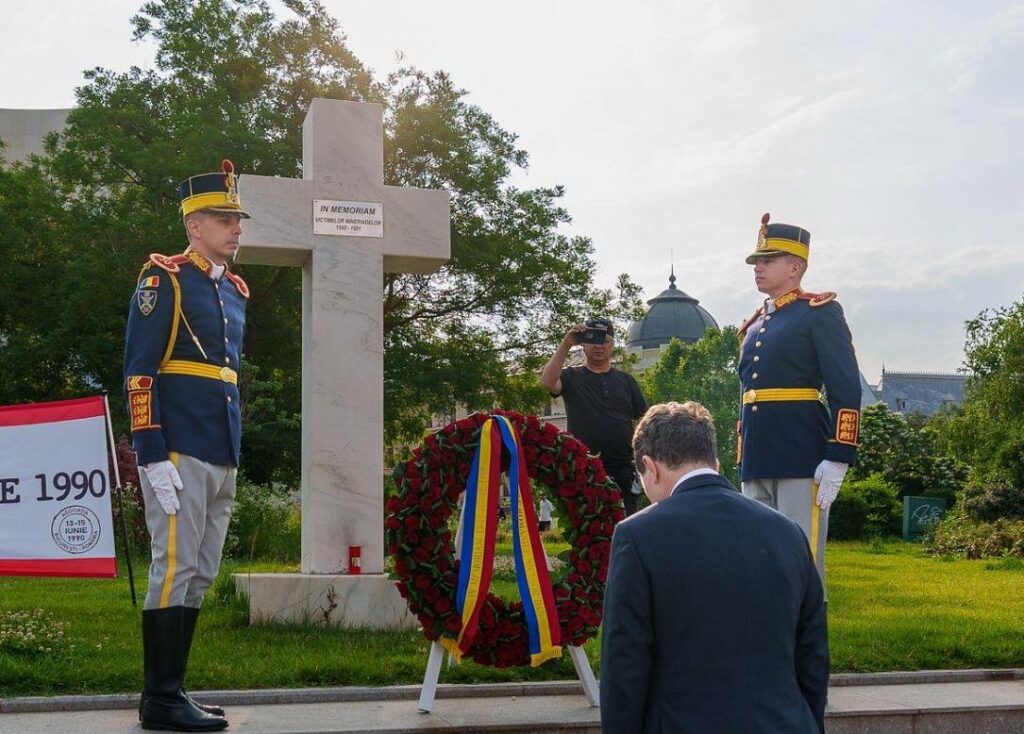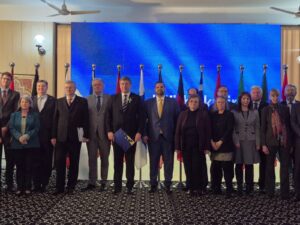President Nicușor Dan Pays Tribute to Victims of 1990 Mineriad, Calls for Justice After 35 Years

Bucharest, The Gulf Observer: Romanian President Nicușor Dan laid wreaths on Friday at two symbolic sites in the capital — the Monument to the Victims of the June 13–15, 1990 Mineriad and the “Kilometer Zero of Democracy” Monument — in solemn remembrance of one of the darkest chapters in Romania’s post-communist history.
The ceremony marked the 35th anniversary of the June 1990 Mineriad, a violent crackdown on peaceful pro-democracy demonstrators in Bucharest’s University Square. The repression, carried out by law enforcement with the support of miners and industrial workers, left four people dead and over 1,300 injured. The events remain a powerful symbol of the country’s turbulent transition to democracy.
In his remarks, President Dan condemned the lack of justice in the case, emphasizing the nation’s ongoing need for truth and accountability.
“Even to this day, after 35 years, justice has not issued a final ruling in the Mineriad case. A verdict is missing that would close so many traumas and sufferings,” Dan said. “Justice has the duty to bring clarity — not only to identify and sanction the guilty, but also as a necessary act of respect for Romanian society’s right to know the truth.”
During the commemoration, a victim who was beaten during the Mineriad asked President Dan whether he would personally pursue the case and seek justice. The President affirmed his willingness to be involved, though he noted it would not be a primary focus in the immediate months ahead.
The 1990 Mineriad stemmed from growing dissatisfaction with the transitional government led by the National Salvation Front (NSF), headed by then-President Ion Iliescu. The protests began on April 22, 1990, following a Christian-Democratic National Peasants’ Party (PNȚCD) rally. University Square soon became a focal point for mass demonstrations, with thousands demanding democratic reforms and the barring of former communist and Securitate officials from public office — a demand encapsulated in Point 8 of the Timișoara Proclamation.
Despite early promises to remain politically neutral, the NSF participated in and overwhelmingly won the parliamentary and presidential elections in May 1990, with Iliescu securing over 85% of the vote. Protests intensified afterward, culminating in mass arrests beginning on June 11. Law enforcement, backed by factory workers chanting hostile slogans such as “IMGB brings order!” and “Death to intellectuals!”, forcefully removed demonstrators.
On June 14, miners from the Jiu Valley were summoned to Bucharest. With Iliescu’s public encouragement, they violently dispersed the remaining protesters, ransacked university faculties, and stormed independent media outlets and opposition party headquarters.
International condemnation followed, but on June 15, Iliescu praised the miners for their “civic sense” and their role in restoring order — a gesture widely seen as an endorsement of state-sanctioned violence.
Thirty-five years on, the wounds of the Mineriad remain open. The lack of legal resolution continues to cast a long shadow over Romania’s democratic journey. President Dan’s tribute serves as both a call to remember the victims and a renewed plea for long-delayed justice.


